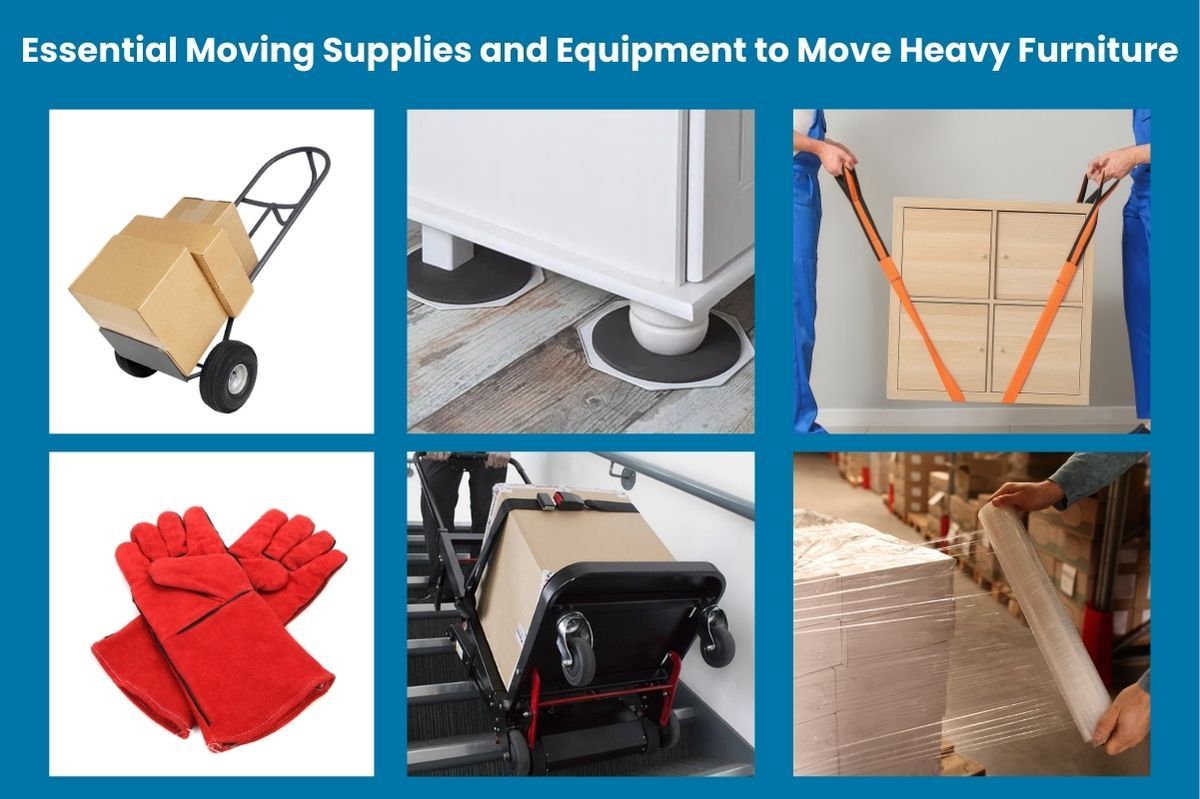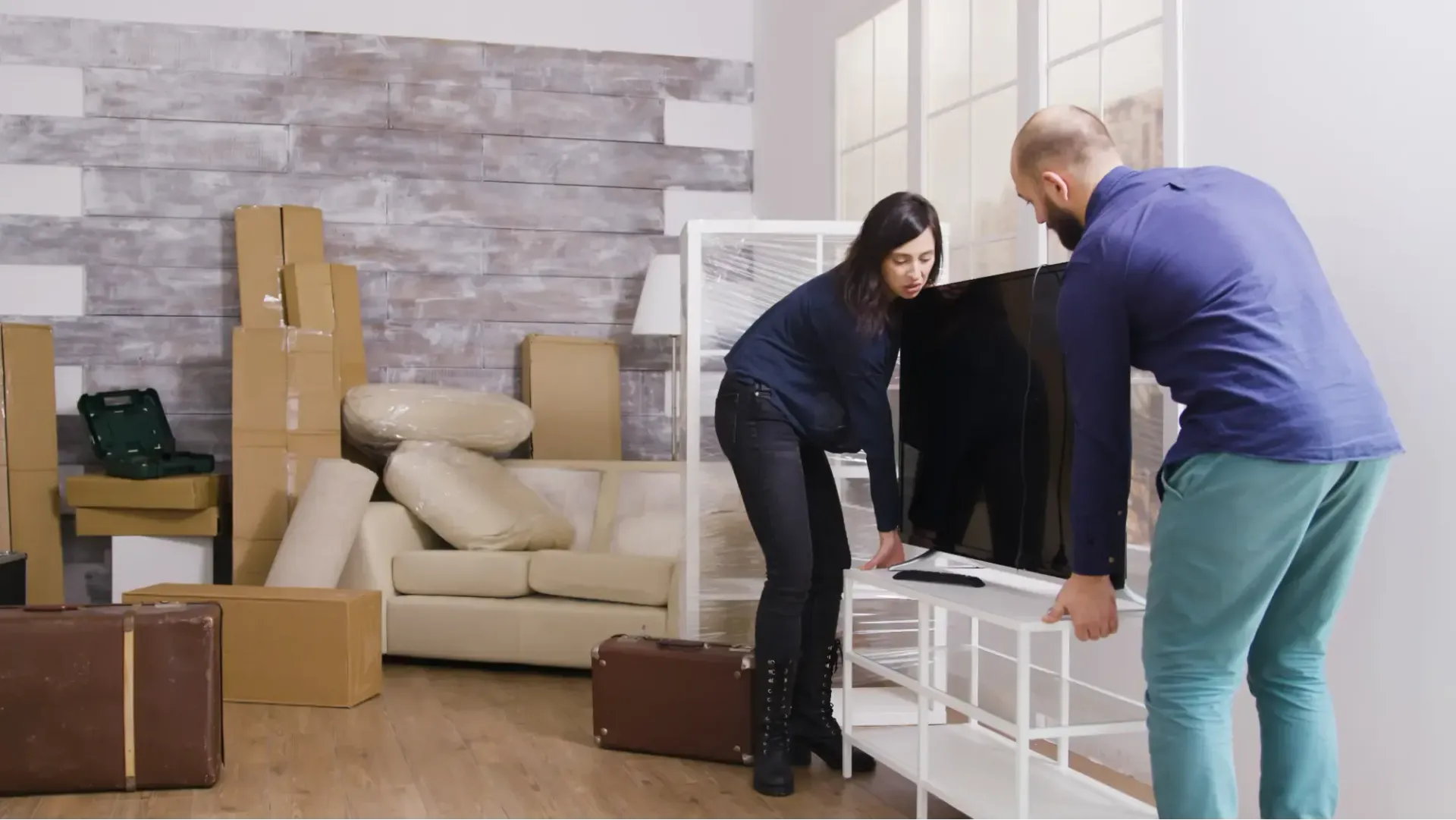How To Move Heavy Furniture By Yourself: 12 Easy Ways & Tricks
TABLE OF CONTENT
- What is Considered Heavy Furniture?
- How to Move Heavy Furniture By Yourself: 12 Tips
- 1. Collect Essential Moving Supplies and Equipment to Move Heavy Furniture
- 2. Plan and Clear The Landing Area to Move Furniture Easily
- 3. Wear Appropriate Clothing When Moving Large Furniture
- 4. How to move heavy furniture? Clear Out Loose Items From Shelves and Dressers
- 5. Use Proper Lifting Techniques to Lift Your Heavy Furniture
- 6. Disassemble Your Heavy Furniture When Possible
- 7. Turn Chairs and Sofas Sideways to Hook Them Around Doorways and Corners
- 8. Use Furniture Sliders to Move Heavy Furniture or Heavy Objects
- 9. Considerations When Moving Heavy Objects Up Stairs
- 10. Moving Heavy Furniture Down Stairs
- 11. Protect Your Furniture Home with Blankets and Plastic
- 12. Consider Hand-Carrying for Valuable Items
- 13. When to Consider Hiring Professional Heavy Furniture Movers?
- FAQ's About Heavy Furniture Moving
Have you ever stood at the bottom of a staircase, a looming furniture piece in tow, wondering just how you'll conquer the task of moving heavy furniture to its new home? Fear not, because with the right strategies and a bit of know-how, even the heaviest item can turn out to be the easiest to move! In the following post, we'll discuss about how to move heavy furniture by yourself, ensuring you're equipped with techniques that save your back and your sanity.
Read more:
What is Considered Heavy Furniture?
Furniture is typically considered heavy if it weighs 250 pounds or more. The following are some of the common items that can be quite large.
- Pianos
- Large Dimension Glass
- Entertainment Centers
- Oversized Dense Furniture made of Oak, Maple or Walnut
- Dressers and Armoires
- Pool Tables
- Exercise Equipment
- Refrigerators and Freezers
- Marble, Granite or Stone Furniture
- Gun Safe/Safes in General
Read more:

How to Move Heavy Furniture By Yourself: 12 Tips
1. Collect Essential Moving Supplies and Equipment to Move Heavy Furniture
- Moving Dolly: A dolly can help you transport heavy items as it allows you to roll furniture rather than lift it.
- Furniture Sliders: Placing sliders under the legs or corners of heavy pieces can significantly reduce friction, allowing items to slide.
- Lifting Straps: These adjustable straps designed to assist with heavy furniture lifting can reduce the strain on your back.
- Heavy-Duty Gloves: Wearing these will protect your hands and improve grip.
- Blankets or Furniture Pads: Using these can prevent scratches, dents, or damage to both your furniture, flooring, and walls.
- Stair Roller: Consider using a stair roller, which attaches to heavy items, making it easier to move them down steps securely.
- Ratchet Straps: Use ratchet straps to secure furniture to a dolly or within a moving vehicle to prevent shifting during transit.
- Stretch Wrap: Applying stretch wrap around dressers or cabinets can keep drawers closed and protect the surfaces from scratches or scuffs.
Read more:
The Best Ways to Pack Dishes for Moving

2. Plan and Clear The Landing Area to Move Furniture Easily
Before you start moving heavy furniture, it's crucial to plan and clear the landing area. Ensure that the path is free of obstacles to prevent accidents and make the moving process smoother. This preparation will save you time and effort, allowing for a more efficient move.
Read more:
Getting Organized After the Moving
3. Wear Appropriate Clothing When Moving Large Furniture
When moving large furniture, wearing the right clothing is essential. Opt for comfortable, close-fitting clothes that won't get caught on anything. Sturdy shoes with good grip are also important to prevent slips and provide support. Proper attire can significantly reduce the risk of injury.

4. How to move heavy furniture? Clear Out Loose Items From Shelves and Dressers
Before moving shelves and dressers, remove any loose items. This step prevents items from falling and breaking during the move. It also makes the furniture lighter and easier to handle. Organizing and packing these items separately will streamline the moving process.
Read more:
Change of Address Checklist: Who to Inform When You Move to a New Address?
5. Use Proper Lifting Techniques to Lift Your Heavy Furniture
When moving heavy items, it is essential to use the proper techniques to avoid injury. Start by standing close to the furniture with your feet shoulder-width apart, giving you a stable base. Keep your back straight, bend at the knees and hips, and lift using the strength of your legs. Never twist your torso while lifting or carrying heavy items as this can lead to back strain. Instead, pivot with your feet to change direction. Remember to hold the furniture close to your body to increase control and reduce strain on your arms and shoulders. If an item is too heavy, consider hiring professional movers. If you find yourself taking your heavy items on a Long Distance Move, reach out to the professionals at Stewart Moving and Storage. Our team can ensure the safety of you and your items with our long distance or interstate moving services. Moreover, you can read more about Long-distance Move Hacks for a comfortable and stress-free move.
6. Disassemble Your Heavy Furniture When Possible
Taking the time to disassemble heavy furniture can seem like an annoying task, but it's a crucial step in easy heavy object moving. Not only does it make the furniture lighter and easier to maneuver through doorways, staircases, and onto the moving truck, it also helps minimize the risk of damage to other parts of the home. Start by removing any drawers, shelves, or detachable panels. Keep screws, bolts, and other small hardware in labeled bags so that reassembling your items at your new location is a breeze. You can also look back on furniture instructions to make disassembling and reassembling a breeze.
Read more: A List of Things We Can’t Move and Why

7. Turn Chairs and Sofas Sideways to Hook Them Around Doorways and Corners
Moving large furniture like chairs and sofas can be challenging, especially when navigating through narrow doorways and tight corners. By turning these items sideways, you can hook them around obstacles more easily, preventing damage and making the process smoother.
Read more: 36 Moving & Packing Tips: A Stress-Free Move Checklist
8. Use Furniture Sliders to Move Heavy Furniture or Heavy Objects
After successfully placing furniture sliders under the corners of your heavy item, you’re ready to glide it across the room easily. Slides are effective for moving big furniture on carpet, but if you’re dealing with hardwood, laminate, or tile, opt for soft, use felt-based sliders to prevent scratches and damage when sliding heavy furniture. Gently push the piece of furniture from the lower section, allowing the sliders to minimize friction and distribute weight evenly. Not only does this method protect your floors, but it also significantly reduces the strain on your body.
Read more: Corporate Movers | Corporate Relocation Company
9. Considerations When Moving Heavy Objects Up Stairs
Before moving heavy items up stairs, always assess the weight and dimensions of the furniture, and the width and shape of the stairwell. It’s recommended you measure doorways, landings, and ceiling heights to avoid getting stuck midway. If possible, disassemble any parts of the furniture to make it lighter and easier to manage. Using moving straps or a dolly can greatly assist in distributing the weight and providing handle points. Always keep the heaviest end of the furniture going up first to reduce the risk of it tipping backward. Communicate clearly with your moving partner, taking slow steps. If the task proves too daunting, don’t hesitate to consult professional movers for heavy furniture who are trained furniture lifters. Even though it may seem easy to do in Short Distance Moving, heavy furniture can be difficult at any time. At Stewart, we can assist with the proper techniques and materials.
Read more: TV Shipping Guide: How To Pack And Ship A TV
10. Moving Heavy Furniture Down Stairs
When going the other direction, make sure to clear the path of any obstacles to avoid tripping or damaging the furniture. Using moving straps or a furniture dolly can drastically reduce the burden of weight and help maintain a controlled movement. It’s also essential to take slow steps and communicate with your partner. Make sure to place the lighter end facing down the stairs and the heavy portion at the top so it will not slide down quickly and put too much strain on one person.

11. Protect Your Furniture & Home with Blankets and Plastic
When moving heavy furniture, using blankets or plastic safeguards your home's walls, floors, and door frames from scuffs, scratches, or dents. Moving blankets, often made from thick, quilted fabric, provide a barrier against bumps and jolts during transportation, effectively preventing damage to both your furniture and home surfaces. Secure these blankets with high-quality plastic wrap. Not only does the plastic shield your items from moisture and dirt, but it also helps you maintain a grip on slippery surfaces. Don't forget to cover high-traffic areas in your home with non-slip floor protectors to prevent scuffs and allow easier maneuvering of heavy items.
12. Consider Hand-Carrying for Valuable Items
When you're traveling or moving, protecting your most valuable possessions is extremely important and it's wise to hand-carry certain items. Hand-carrying valuable items means they stay with you at all times, reducing the risk of theft, loss, or damage that can occur with checked luggage or shipped goods. Whether it's expensive jewelry, family heirlooms, or sensitive documents, keeping these items on your person helps you maintain control over their security. You'll be able to monitor these items throughout your travels, giving you peace of mind.
Read more: Average Cost to Move a 3-Bedroom House
13. When to Consider Hiring Professional Heavy Furniture Movers?
Professionals are equipped to handle large, bulky items with care and expertise, ensuring nothing gets damaged—including your back! If you're dealing with particularly heavy pieces, if you have to navigate narrow passageways, if you own valuable or antique furniture that requires special handling, or if you simply lack the necessary equipment and manpower, get some extra help. Professional heavy furniture lifters and sliders have the training and tools to move heavy furniture efficiently. Hiring professionals is the best way to move furniture easily. Whether you’re looking for help with a local move or need Cross Country Movers, the experts at Stewart Moving & Storage can help you create a moving plan that meets your needs.
Read more:
How to choose the best moving company

In this article, we have shared tips to help you move heavy furniture easily without causing damage and ensuring the safety of them. If you are looking for a reputable and professional moving company for long distance or local move, office moving or military moving services, contact Stewart Moving & Storage today to receive moving estimates.
> Learn more about our moving services:



